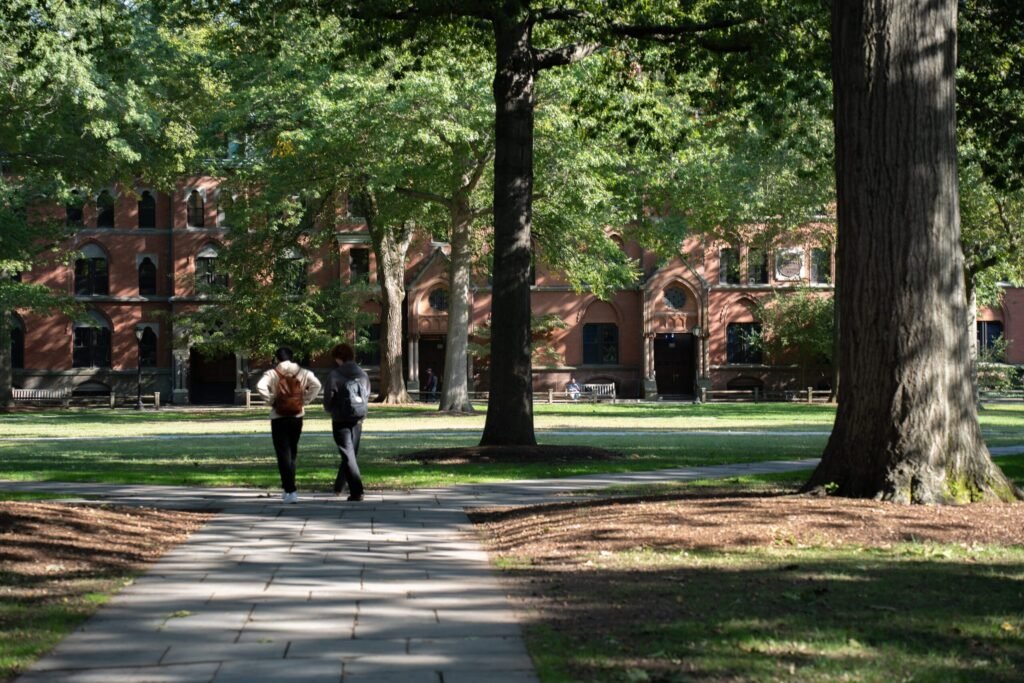In the last four years, Yale’s mental health policies and resources have expanded to include increased flexibility for academic accommodations and increased mental health support for students.
Ada Perlman
Staff Reporter
Ellie Park, Senior Photographer
Content warning: This article contains references to suicide.
The National Suicide Prevention Lifeline is a hotline for individuals in crisis or for those looking to help someone else. To speak with a certified listener, call 988.
Crisis Text Line is a texting service for emotional crisis support. To speak with a trained listener, text HELLO to 741741. It is free, available 24/7 and confidential.
To talk with a counselor from Yale Mental Health and Counseling, schedule a session here. On-call counselors are available at any time: call (203) 432-0290. Appointments with Yale College Community Care can be scheduled here.
Students who are interested in taking a medical leave of absence should reach out to their residential college dean.
Additional resources are available in a guide compiled by the Yale College Council here.
When the class of 2025 arrived in New Haven, many on campus were still reckoning with the death of Rachael Shaw-Rosenblum ’24, who died by suicide in the spring of 2021.
Over the last few years, the University has changed its mental health policies after a lawsuit by Elis for Rachael — a group founded in memory of Shaw-Rosenblum — alleged that Yale’s withdrawal policies violated federal statute. In 2021, Yale College established Yale College Community Care, commonly referred to as YC3, to provide accessible mental health support for students.
“I have seen an upward trend of mental health advocacy groups around campus and a lot more conversations, articles, investigations and pushes for change so that’s really good,” Chloe Hong ’25.5, who began her first year in 2018 and will be graduating with the class of 2025 after multiple medical leaves, wrote to the News.
Hong noted improvements for students with mental health concerns, including a change in 2024 that allows Dean’s Extensions to be explicitly granted for mental health reasons.
When Hong first took leave from the University in the fall of 2020, she described that students used to be “cut off” from Yale’s medical resources. Hong explained that this system “didn’t make sense,” especially for students lacking alternative support structures.
After Elis for Rachael sued the University — claiming that its withdrawal policies violated the Americans with Disabilities Act, the Rehabilitation Act, the Fair Housing Act and the Patient Protection and Affordable Care Act — Yale began to overhaul its campus policies regarding mental health.
Elis for Rachael Inc. v. Yale University was settled in 2023. The settlement included a clarified reinstatement process with individualized lengths of absence, continued campus inclusion during time away, part-time study, access to Yale’s healthcare coverage and a scheduled system for tuition, room and board refunds.
In 2021, Yale College had expanded its mental health resources, most notably through the establishment of YC3 — a program in the residential colleges that offers students drop-in support with licensed social workers.
Students who used YC3 resources said that they are ideal for those who may need short-term support without having to wait to see a therapist at Yale Mental Health and Counseling.
Orah Massihesraelian ’25.5 echoed stated that YC3 was the “best thing that’s been done” because of its straightforwardness and accessibility. She recalled joining YCC during her junior year to advocate for more mental health policy changes, which included meeting with Chief of Yale Mental Health and Counseling Paul Hoffman.
“It was only when I joined YCC in junior year that I realized how much more power there was to make change,” Massihesraelian said.
In 2024, Hoffman stated that YMHC has the largest staff of any school of equivalent size and one of the largest staffs of any college mental health center in the country. They have also partnered with Yale’s graduate and professional schools to create counseling programs in seven schools beside Yale College and opened two additional locations at 205 Whitney Ave. and 60 Temple St.
Despite these changes, mental health accommodations were a top issue for many students when selecting a new University president according to a survey from the Presidential Search Student Advisory Council. Students named concerns such as wait times at Yale Mental Health and Counseling and the quality and consistency of care provided.
Outside of changes related to academic accommodations, organizations such as Elis for Rachael and the Yale Student Mental Health Association continue to raise awareness about the resources available to students who are struggling with their mental health. YSMHA recently hosted their annual “Mind Over Matter” event to engage with wellness resources across Yale and New Haven.
Yale Mental Health and Counseling’s primary office is located at 55 Lock St.
